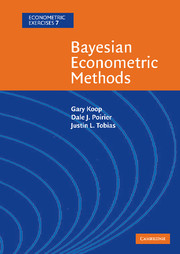Book contents
- Frontmatter
- Contents
- List of exercises
- Preface to the series
- Preface
- 1 The subjective interpretation of probability
- 2 Bayesian inference
- 3 Point estimation
- 4 Frequentist properties of Bayesian estimators
- 5 Interval estimation
- 6 Hypothesis testing
- 7 Prediction
- 8 Choice of prior
- 9 Asymptotic Bayes
- 10 The linear regression model
- 11 Basics of Bayesian computation
- 12 Hierarchical models
- 13 The linear regression model with general covariance matrix
- 14 Latent variable models
- 15 Mixture models
- 16 Bayesian model averaging and selection
- 17 Some stationary time series models
- 18 Some nonstationary time series models
- Appendix
- Bibliography
- Index
Preface
Published online by Cambridge University Press: 05 June 2012
- Frontmatter
- Contents
- List of exercises
- Preface to the series
- Preface
- 1 The subjective interpretation of probability
- 2 Bayesian inference
- 3 Point estimation
- 4 Frequentist properties of Bayesian estimators
- 5 Interval estimation
- 6 Hypothesis testing
- 7 Prediction
- 8 Choice of prior
- 9 Asymptotic Bayes
- 10 The linear regression model
- 11 Basics of Bayesian computation
- 12 Hierarchical models
- 13 The linear regression model with general covariance matrix
- 14 Latent variable models
- 15 Mixture models
- 16 Bayesian model averaging and selection
- 17 Some stationary time series models
- 18 Some nonstationary time series models
- Appendix
- Bibliography
- Index
Summary
Bayesian econometrics has enjoyed an increasing popularity in many fields. This popularity has been evidenced through the recent publication of several textbooks at the advanced undergraduate and graduate levels, including those by Poirier (1995), Bauwens, Lubrano, and Richard (1999), Koop (2003), Lancaster (2004), and Geweke (2005). The purpose of the present volume is to provide a wide range of exercises and solutions suitable for students interested in Bayesian econometrics at the level of these textbooks.
The Bayesian researcher should know the basic ideas underlying Bayesian methodology (i.e., Bayesian theory) and the computational tools used in modern Bayesian econometrics (i.e., Bayesian computation). The Bayesian should also be able to put the theory and computational tools together in the context of substantive empirical problems. We have written this book with these three activities – theory, computation, and empirical modeling – in mind. We have tried to construct a wide range of exercises on all of these aspects. Loosely speaking, Chapters 1 through 9 focus on Bayesian theory, whereas Chapter 11 focuses primarily on recent developments in Bayesian computation. The remaining chapters focus on particular models (usually regression based). Inevitably, these chapters combine theory and computation in the context of particular models. Although we have tried to be reasonably complete in terms of covering the basic ideas of Bayesian theory and the computational tools most commonly used by the Bayesian, there is no way we can cover all the classes of models used in econometrics.
- Type
- Chapter
- Information
- Bayesian Econometric Methods , pp. xix - xxiiPublisher: Cambridge University PressPrint publication year: 2007

